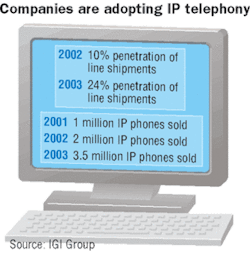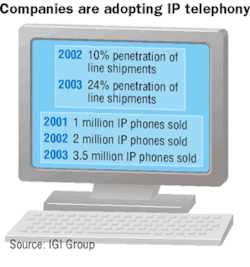VoIP continues to make inroads despite security hurdles
Voice over Internet Protocol (VoIP) is a business platform that can deliver an application rich environment—if it can just overcome market shyness and some lingering roadblocks.
That was the message during the recent VoIP Market Forum, sponsored by international consultance Information Gatekeepers Inc. (Brighton, MA; www.igigroup.com), held at the Burlington (MA) Marriott. The forum was designed to look at the growth of VoIP and how it is impacting telecom markets.
Voice over IP sends voice over the Category 5e and 6 cables of any IP network, using a PC as a soft phone. According to many who spoke at the forum, shifting costs are making VoIP a more attractive option for enterprise end users. Speakers claimed that the cost of running a converged network is less expensive today than it was four years ago.
Speakers also said end users who are experimenting with VoIP want as many choices as possible, and interoperability with other vendors' products.
But impediments remain, including security, where company firewalls can block unknown ports. Reliability also remains a big issue. "It is reliable, but people don't know how to manage it," said speaker Mark Gaynor, assistant professor for Boston University's School of Management's Information Systems Department (www.bu.edu).
Still, VoIP is making inroads. AT&T (www.att.com) began a VoIP trial in three states last October. It plans to offer work-at-home Centrex-like services using VoIP. On June 7, AT&T announced global VoIP telework trials targeting multi-national companies. The trials are scheduled to begin later this year in Australia, Hong Kong, Singapore and the United Kingdom. Full launches are expected next year.
In addition, MCI (Ashburn,VA; www.global.mci.com) is offering a VoIP service primarily for businesses, and Sprint (Overland Park, KS; www. sprint.com) is offering VoIP on its frame relay services. Meanwhile, Level 3 Communications (Broomfield, CO; www. level3.com) has extended its wholesale VoIP services to the end user.
In its most optimistic scenario, IGI Group forecasts that AT&T will start VoIP this year and reach one million lines by the end of next year. MCI will duplicate AT&T, according to the IGI.Group forecast. After 2005, the growth rate will be 25%.
Boston University's Gaynor also argues that IP telephony is slowly killing off traditional voice, citing a study by 3Com, which gathered data from five companies and institutions (including itself)—British Petroleum, Microsoft, Health Net, and Texas A&M University. The company analyzed the cost of data and voice networks, and estimated the cost of transitional and converged networks, and Gaynor says 3Com's study finds that VoIP will generate 30% cost savings.
According to the 3Com studies: the PC as soft phones played an important role; VoIP will co-exist with traditional voice, presumably until VoIP proves itself; modern LAN infrastructures are sufficient for VoIP; and some work forces have already abandoned the traditional desktop phone for VoIP.

